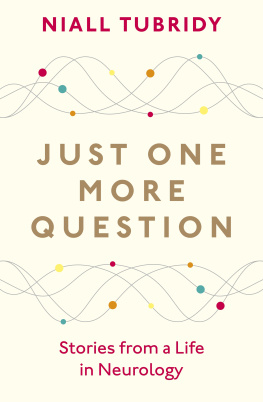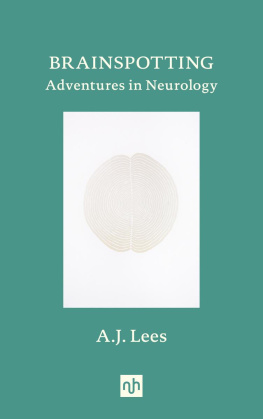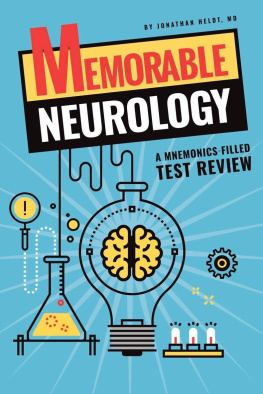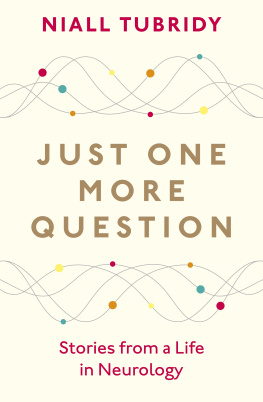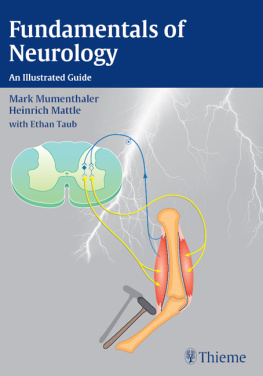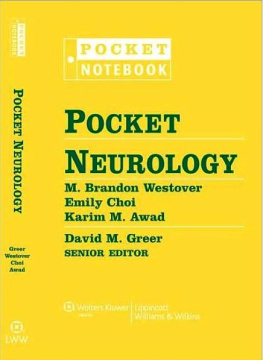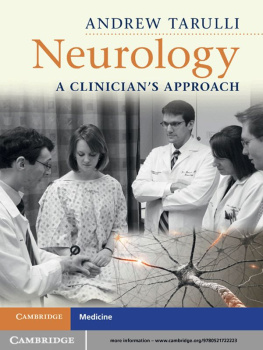Niall Tubridy
JUST ONE MORE QUESTION
Stories from a Life in Neurology

PENGUIN IRELAND
UK | USA | Canada | Ireland | Australia
India | New Zealand | South Africa
Penguin Ireland is part of the Penguin Random House group of companies whose addresses can be found at global.penguinrandomhouse.com.

First published 2019
Copyright Niall Tubridy, 2019
The moral right of the author has been asserted
ISBN: 978-1-844-88458-2
This ebook is copyright material and must not be copied, reproduced, transferred, distributed, leased, licensed or publicly performed or used in any way except as specifically permitted in writing by the publishers, as allowed under the terms and conditions under which it was purchased or as strictly permitted by applicable copyright law. Any unauthorized distribution or use of this text may be a direct infringement of the authors and publishers rights and those responsible may be liable in law accordingly.
To
The Wednesday Barrel Club
When youre reading this account of my life in neurology, you should be aware that while everything told here is true, the raw material has been reconfigured. My experiences of dealings with patients and colleagues have been broken down and reconstructed. Cases are merged, so many of those outlined are composites of different stories, and I have been careful to either omit or change identifying details about patients. If you have been a patient of mine and think you recognize yourself, it is not possible that you could be the patient described in the pages that follow; please be assured that any similarity is coincidental.
The chief function of the body is to carry the brain around.
Thomas A. Edison
About the Author
Niall Tubridy was awarded his medical degree from the Royal College of Surgeons in Ireland in 1991. He went on to work in hospitals in Dublin, London, Paris and Melbourne. Since 2004, he has been a consultant neurologist at St Vincents University Hospital, Dublin. He is also a professor of clinical medicine at University College Dublin.

1
EARLY LESSONS
You never forget the first time you tell someone their life is going to change for ever. I was twenty-eight and my patient was just three years younger. While out jogging Jenny had lost the power in her left leg and had gone to see her GP . He sent her to Casualty locally and they sent her immediately to the neurology department at the large London hospital where I was then training. My boss, the consultant neurologist, had been called away, so I had to see her on my own. A nurse helped her into the examining room. By now both of her legs were so weak that even with support she walked very unsteadily.
I was as nervous as Jenny was fearful. I took her medical history and she mentioned that an uncle had multiple sclerosis. This was a red flag because given her symptoms and profile young, white and female MS was a very strong possibility. She casually mentioned that she had experienced an episode, a few years before, of blurred vision for a few weeks but had ignored it at the time. I did some routine neurological tests. She had very brisk knee reflexes a bad sign. When I stroked the soles of her feet her big toes sprang upwards also a bad sign. In adults the big toe should bend downwards when the sole of the foot is stroked but when the nervous system is damaged it returns to its baby state and goes up instead. So when Jennys big toes jumped upwards I knew that she had suffered serious nerve damage.
A few weeks later, I had the results of her MRI scan and her brain showed all the markers we expect to see in someone with MS . Though I was confirming to Jenny what we had both strongly suspected, this was still a shattering moment.
My uncle has been in a wheelchair for as long as I can remember, she said when I told her. She began to cry.
I said that not all people with MS become wheelchair-dependent. She asked if I could guarantee that she would not and I had to say no.
This was in pre-Google days so patients knowledge about neurological conditions tended to be anecdotal. That meant, inevitably, that high-visibility worst cases were the ones people knew about. Jenny, naturally, thought of her uncle. She was unaware of all of those with MS who got on with quite normal lives and were not debilitated. It wasnt for Jenny to know that she had a good chance of a better life than her uncle and, hopeful as I was, I couldnt make any promises. All I could hope to do was help her understand her condition, explain the, at that stage rather limited, treatment options available and encourage her as much as possible.
I took a particular interest in Jennys situation because it was a personal milestone for me doctors are morbidly excited by their first major diagnosis, and I was no different. Grim though it sounds, young medics passion for their discipline is what drives their initial efforts to help their patients. Like all jobs, youre pleased to be putting your hard years of study into practice in the real world. You want to tell your friends about your big diagnosis and track the impact of your attempts to help people. Now I felt like a neurologist.
It had taken me a few years to figure out what kind of doctor I wanted to be. Dissecting a brain in the anatomy lab was, well, gruesome. So I knew that surgery was not for me pretty much straight away. I liked cardiology as well, and I was also giving some thought to being a geriatrician. Then in fourth year we were assigned to the hospital wards. This was daunting. Like generations of students before and since, we wandered forlornly around the wards trying to keep out of everyones way. During ward rounds we would hang around in the background while the real doctors spoke to and examined patients. We loved those teachers who gave us the time to explain things, and those who were the most demanding would always turn out to be the most enthusiastic, and certainly the ones we remembered.
One of my earliest rotations was with the neurology team. Leading the team were two well-known consultants. They seemed to stand head and shoulders above the other physicians at least in my young eyes. Their clinical acumen was terrific and, with an almost insouciant arrogance, they would appear to take only a few minutes to diagnose a patient. They could always make a complicated diagnosis look easy. There was a significant amount of ego involved, for sure, but underneath the bravado there was great clarity in what they were doing and how they went about it.
So I loved neurology from the start. I loved the logical nature of the history taking and examination. I was amazed by the finely tuned way that neurologists listened to every cadence of a patients voice; how they watched, all but forensically, every flicker of movement. They were like expert electricians who could find the precise area where the wiring or the bulbs were faulty. And I loved the discussions they would have about unusual cases and how they would argue over one clinical sign after another. Watching from the back of the group of nurses and junior doctors was exhilarating.
Beyond that, I was humbled to learn so much from the patients who were frequently getting a life-changing diagnosis how they responded emotionally to what life had thrown at them, and how their loved ones watched on in their moments of agony and ecstasy. I thought that nothing could top looking after people whose brains were sick. I saw it as a wonderful way to get to know patients as individuals at what I felt was a deeper level.

